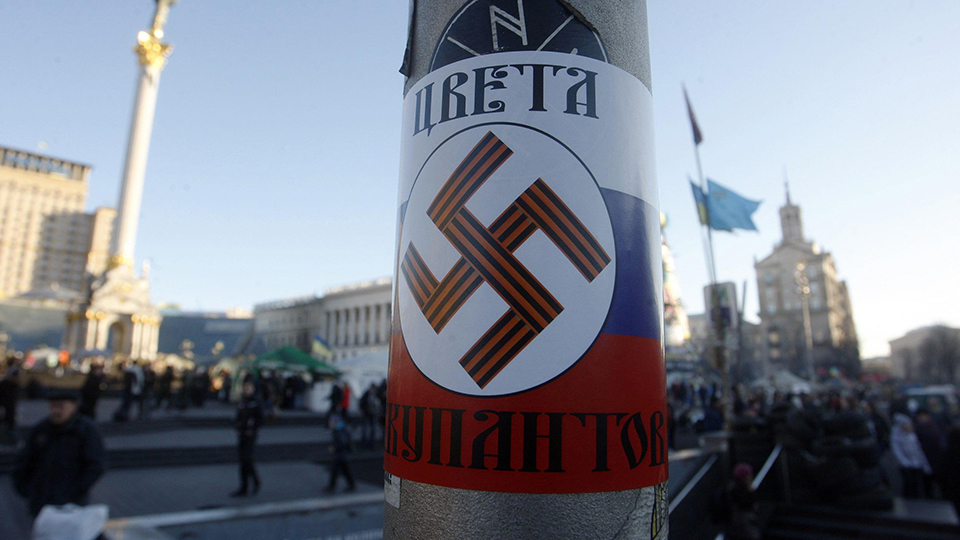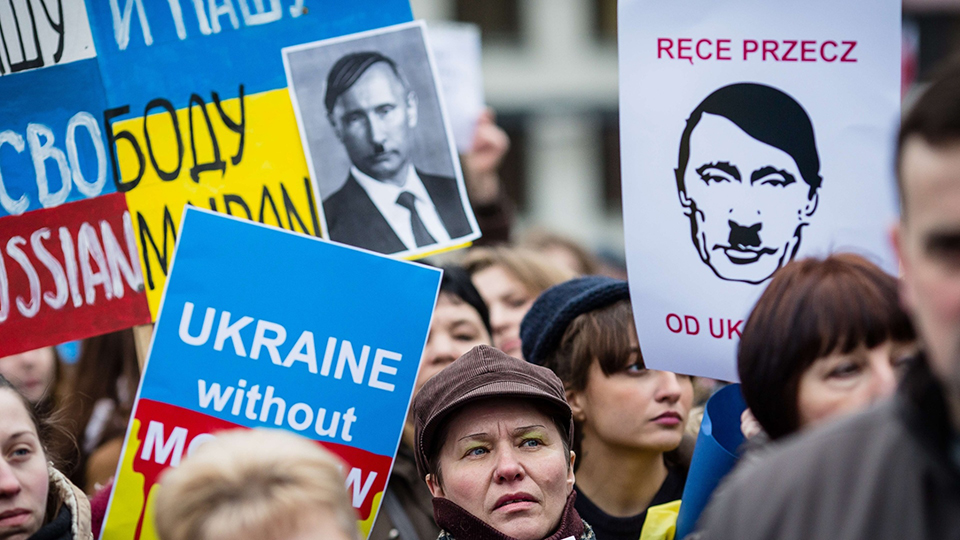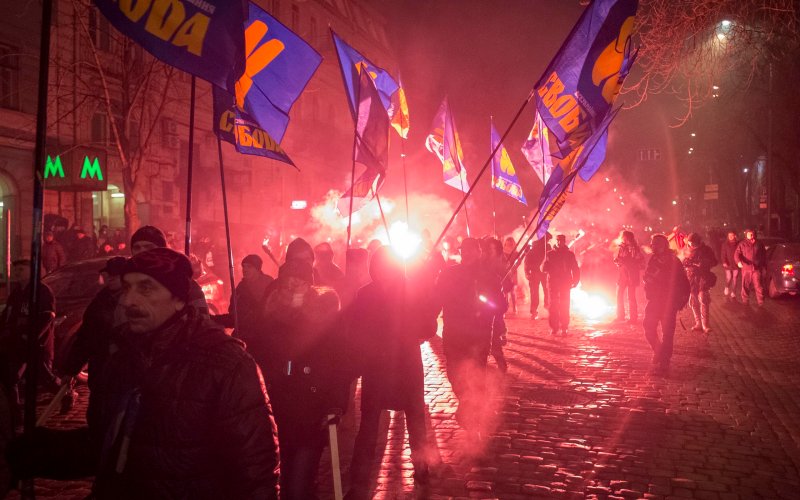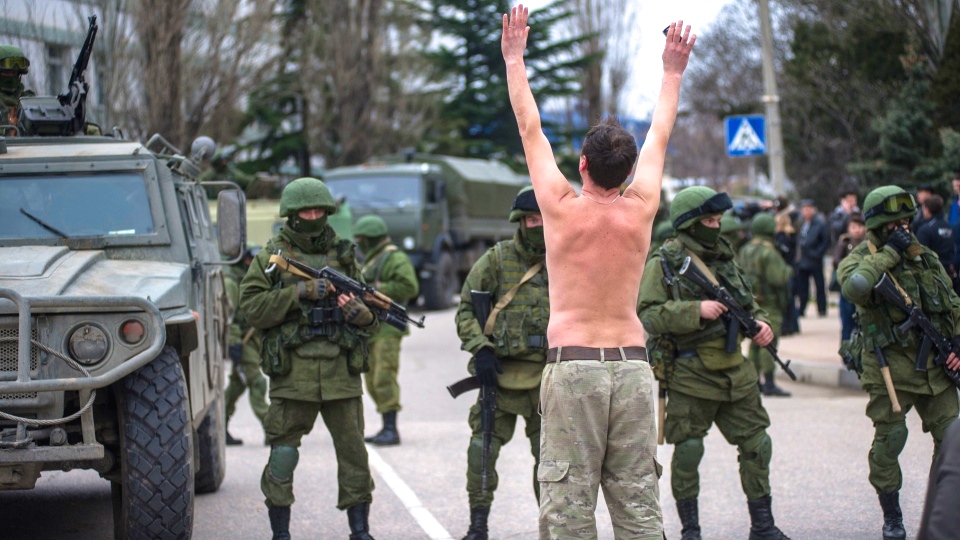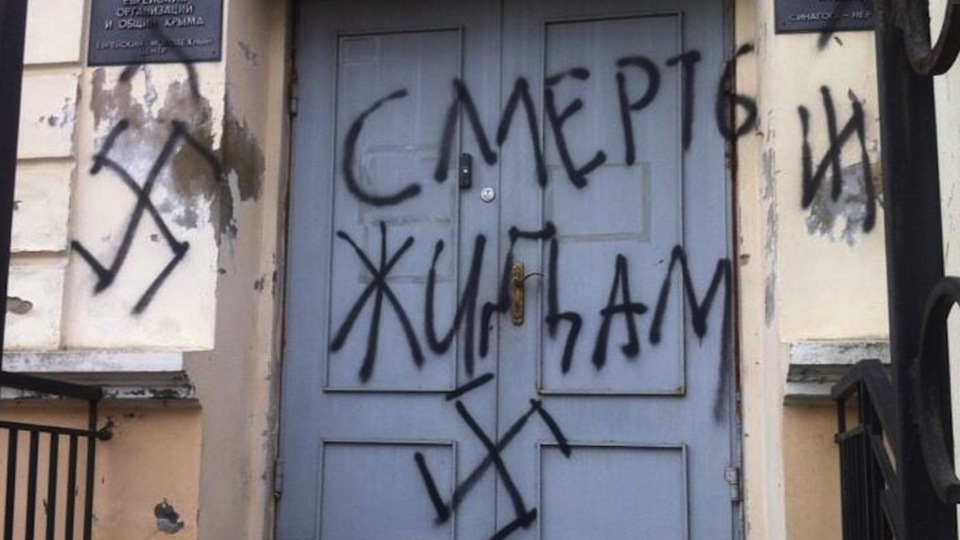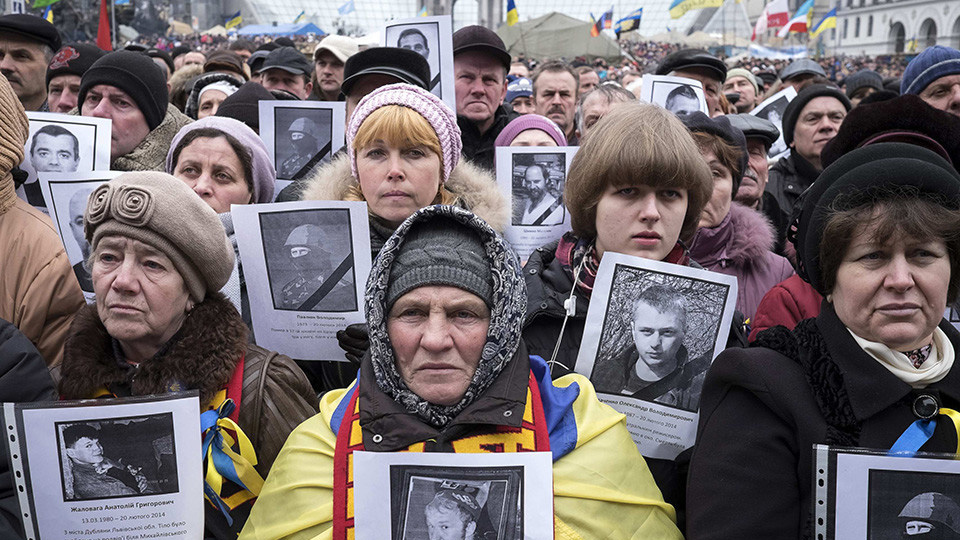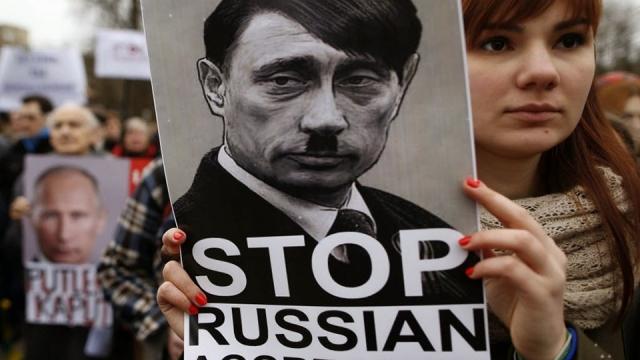
A new Cold War has arisen between Russia and the U.S. over the future of Ukraine. With that has come accompanying discussions about the nature of portions of the U.S.-backed Neo-Nazi and anti-semitic opposition in the embattled former Soviet Republic.
Lost in the discussion so far — even as a “media war” burgeons between the superpower states — is a crucial piece of history lending context to the ongoing geopolitical stand-off that centers around anti-Semitism and the original Nazis themselves. Enter the U.S.-funded state-run international media outlets Voice of America (VOA) and Radio Free Europe/Radio Liberty (RFE/RL).
While Russia Today (better known to many as “RT”) has found itself at the center of a firestorm of U.S. media coverage and scrutiny, VOA and RFE/RL have gotten off essentially scot-free so far – even though they received over $206 million and $93 million in taxpayer money, respectively, from the U.S. government in 2012.
Case in point: on April 3, President Barack Obama signed a bill into law on “United States International Programming to Ukraine and Neighboring Regions” after it passed quickly and with little debate in both chambers of Congress. The bill mandates an injection of $10 million total in taxpayer-funded cash into the coffers of both VOA and RFE/RL to air their news coverage in the Tatar, Ukrainian and Russian languages 24/7.
Not a single media outlet covered the legislation’s passage. That, even though the bill was passed explicitly to fend off RT’s hegemony in the region and is stated so within the legislation.
“The Russian Government has deliberately blocked the Ukrainian people’s access to uncensored sources of information and has provided alternative news and information that is both inaccurate and inflammatory,” reads the bill. “The opinions and views of the Ukrainian people...are not being accurately represented in Russian dominated mass media...United States international programming has the potential to combat this anti-democratic propaganda.”
Because the U.S. media was silent on the bill becoming law to begin with, it’s only logical that the history and agendas of VOA and RFE/RLweren’t investigated with the same rigor as RT either.
But as novelist Alice Hoffman has stated, “Once you know some things, you can't unknow them. It's a burden that can never be given away.”
Bloodstone: Cold War, Cold Truth
The truth is simple, though likely hard — nay, nearly impossible — for most U.S. citizens to fathom living in the self-proclaimed “city upon a Hill.” Birthed during World War II and at the beginning of the Cold War, respectively, VOA and RFE/RL have Nazi-tied historical roots. More specifically, rewind to the State Department’s then-covert Operation Bloodstone, which began in 1948.
“Bloodstone proved to be an open door through which scores of leaders of Nazi collaborators who were now being brought to the United States for use as intelligence and covert operations experts,” explained American University Professor Christopher Simpson in his book“Blowback: The First Full Account of America's Recruitment of Nazis and Its Disastrous Effect on The Cold War, Our Domestic and Foreign Policy.”
Simpson also explains in his book that Frank Wisner — former head of Office of Strategic Services (which became the Central Intelligence Agency, or CIA), then head of the Directorate of Plans for the CIA — initially proposed that 250 Nazi collaborators be brought into the U.S. under Bloodstone’s auspices. Wisner’s vision: 100 of them would work for VOA, all of which Simpson discovered via Freedom of Information Act (FOIA) requests.
The CIA created a special sub-unit to oversee the recruitment of ex-Nazi collaborators called the Office of Special Projects, which later changed names and became the Office for Policy Coordination. Legally, the National Security Council authorized the activity through directive NSC 10/2, at the time a covert program (now publicly disclosed) that was known about only by what Simpson described as “a tiny group of men and women at the most senior levels” of the national security establishment.
NSC 10/2 and Bloodstone are also chiefly responsible for the creation and bolstering of what at the time were two separate seemingly independent media outlets: Radio Free Europe and Radio Liberation from Bolshevism.
“RFE/RL began in 1948 as a corporation named the National Committee for a Free Europe, a supposedly private charitable organization dedicated to aiding exiles from the Soviet-occupied Eastern Europe,” Simpson explains in his book. “[But] the roots of RFE/RL, in an administrative sense, are the same political warfare programs that gave birth to Bloodstone and NSC 10/2.”
National Committee for a Free Europe’s initial Board of Directors was a “Who’s Who” of US political elites, with Henry Ford II, Henry J. Heinz, George C. McGhee and other influentials all in on the game.
U.S. labor’s “New Men of Power” also got involved. James Carey — former secretary-treasurer of the CIO and vice-president of the AFL–CIO — was also on National Committee for a Free Europe’s Board.
Simpson says this “all-star board of directors...served as a cover, in effect, to explain where all the money was coming from.” That is, from the CIA.
What’s In a Name?
At times, this was all handled in a ham-handed way. Indeed, so much so that if journalists had only bothered to ask some tough questions, they’d start finding some pretty disturbing answers. Such as asking the age-old question: “What’s in a name?” Simpson figured it out and explained it in his book.
“In a number of cases [RFE/RL] recruiters did not even bother to change the names...of the nationality committees that had served the Nazis,” he wrote. “In a revealing act of indiscretion, even the U.S. cover organization for the Radio Liberation operation, the American Committee for the Liberation of the Peoples of Russia, took its name directly from the Klasov’s Komitet Osvobozhdeniia Narodov Rossii, which had been created under joint SS and Nazi Foreign Office sponsorship in...1941.”
And then there’s the term “bolshevism” itself, which was thrown around as a pejorative in Nazi Germany. As Simpson put it:
"The Soviet government lost no time in pointing out the rhetorical similarity between [RFE/RL] broadcasts and those of the Nazis as well as the fact that a number of easily identified Nazi collaborators were working for the station…[RFE/RL] eventually [was] forced to ban the use of the term Bolshevism in [its] news broadcasts because of its unmistakable association with Nazi propaganda in the minds of European listeners."
But the icing on the cake is “liberation” as a concept, which Simpson devotes a whole chapter to in his book. He writes that “liberation philosophy” ties back to “émigré propagandists who had worked for the Nazis on the Eastern Front during World War II.”
An example of “liberation” ideology is a document titled, “The World's Dilemma and A Way Out: Liberation of the Peoples of the Soviet Union”, published in 1953 by the American Committee for Liberation From Bolshevism.
The American version of “liberation” differentiated itself in important ways to the Nazi version, with the U.S. preferring the spread of what University of California-Santa Barbara sociologist William I. Robinson calls “low-intensity democracy”, or what many today know asneoliberalism.
“[It] abandoned the racial theories and anti-Semitism of the earlier Nazi propaganda. Liberation, in the United States’ hands, was billed as the fulfillment of America’s own revolutionary heritage of resistance to tyranny,” explained Simpson.
The ex-Nazis quickly learned that spouting out anti-Semitic tropes wasn’t appropriate if they were going to earn a living on the U.S. dime.
“Their adoption of lip service to democracy began to provide former Fascists with a platform to promote their agenda to millions of Americans, and it created a shelter, in effect, that protected them from the exposure of their Nazi pasts,” writes Simpson. “They were no longer seen as the triggermen of Nazi genocide in the public mind but, rather, as fervent anti-Communist patriots.”
Fast-forward to 1952 and “liberation” became a central prong of the Republican Party foreign policy platform and a central piece of its electoral campaigns for that election cycle. Simpson points out in his book that many of the same people promoting the agenda abroad as part of the RFE/RL “Crusade for Liberty” came home and aimed the same propaganda at the U.S. public during that campaign cycle.
“Weltanschauung”: Past is Prologue
Harvard Professor Joseph Nye conceptualized "soft power" in his 1990 book "Bound to Lead: The Changing Nature of American Power."Simpson believes RT, VOA and RFE/RL all fit within that mold.
"These types of initiatives are very problematic, whether it's Russia, the United States, China or whoever else because what they do is they pursue their international strategy of their sponsors in other countries. It's a global effort to shape attitudes in targeted countries," he told Occupy.com.
Indeed, RFE/RL still champions itself today as utilizing rebranded “soft power,” now calling it “smart power.”
Former Deputy Assistant Secretary of State for International Organization Affairs Suzanne Nossel (also formerly a higher-up at Amnesty International and Human Rights Watch) rebranded it as such in a 2004 essay appearing in Foreign Policy by that namesake.
Coming full circle, Nazi Germany coined soft power’s widespread application as “weltanschauung” — German for “worldview warfare” — and better known today as psychological warfare (PSYOPs). Simpson breaks this down in a different book titled, “Science of Coercion.”
As the wielders of the term and the use of U.S. version of “weltanschauung” understood it, PSYOPs are the “scientific application of propaganda, terror, and state pressure as a means of securing an ideological victory over one's enemies,” Simpson explains in his book.
Students of history understand that — as Shakespeare once put it — “What's past is prologue” and “weltanschauung” has reared its ugly head once again in the geopolitical “Great Game” currently unfolding in the Ukraine between the U.S. and Russia.
As Simpson put it in an interview: "In this present situation, one sees a very conscious effort in propaganda to nurture a particular worldview on both sides of this geopolitical tit-for-tat — and it's a worldview favored by the dominant political, social and economic factions in each society — to be used against its rivals."
3 WAYS TO SHOW YOUR SUPPORT
- Log in to post comments

